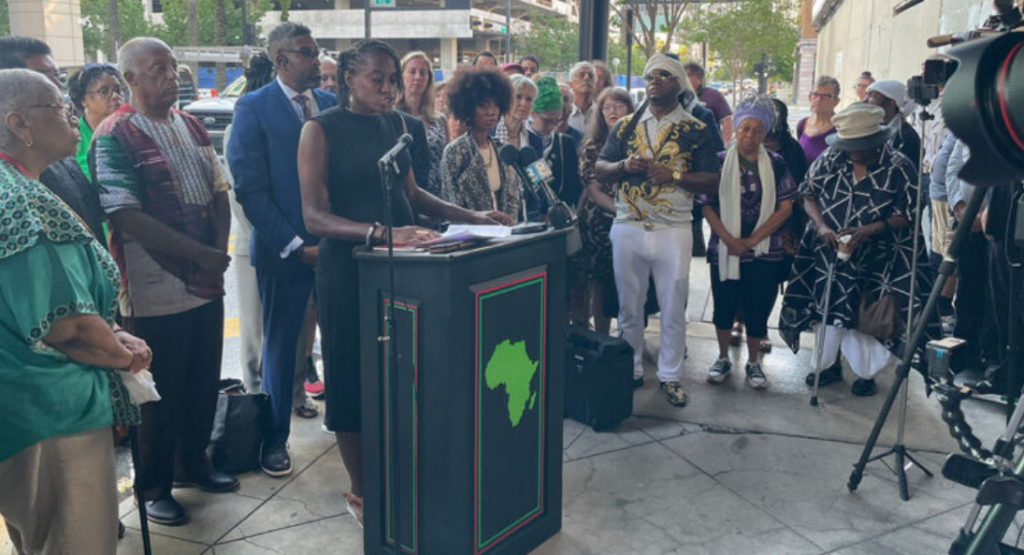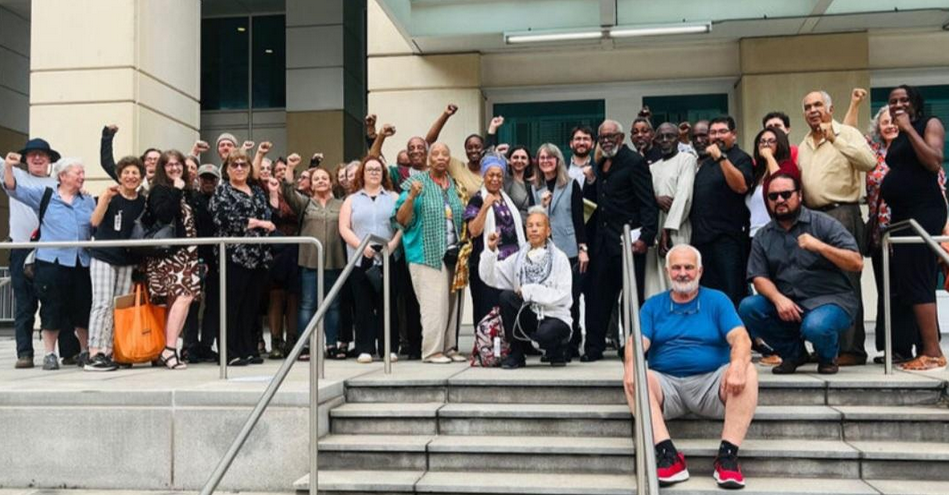By Hands Off Uhuru
Photos: Hands Off Uhuru\YouTube Screenshots
[Column: Handsoffuhuru.org]
Tampa, FL—The first week of the free speech trial of Chairman Omali Yeshitela, Penny Hess and Jesse Nevel left observers shaking their heads and asking how the government has dedicated 30 FBI agents over the course of 3 years, conducted military raids on peaceful U.S. residents, offered a $10 million reward for information and still has no case.
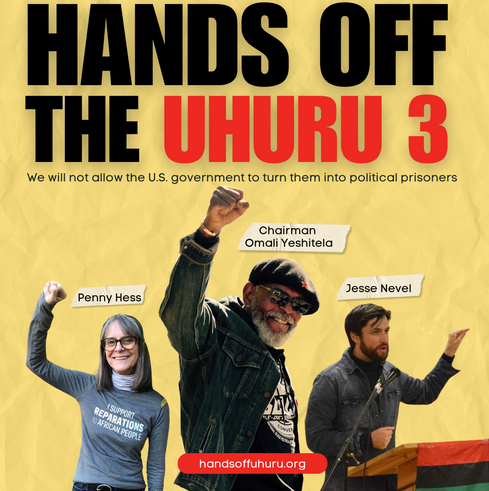
With only one witness left, the prosecution has failed to present any actual knowledge or evidence of the government’s baseless charges that the Uhuru 3 are “secret pawns in a Russian government conspiracy to sow political discord and interfere in elections”.
The government has made the outlandish accusation that Omali Yeshitela, Chairman of the African People’s Socialist Party, as well as two leaders in the organization’s solidarity component Penny Hess and Jesse Nevel, were paid and under the control by the Russian government when they took a petition to the U.N. charging the U.S. with genocide, testified at U.N. hearings for Reparations to African people, published an article opposing the ban on Russian athletes in the Olympics, ran for public office on a Reparations platform and spoke out against the U.S./NATO proxy war using Ukraine against Russia.
The Uhuru 3 have expressed these same opinions and fought for the right of Black people to vote and run candidates in elections for over 50 years.
The government’s first “expert” witness, a professor of political science at Syracuse University, shared his views on Russian intelligence services but admitted he knows nothing about the case of the Uhuru 3.
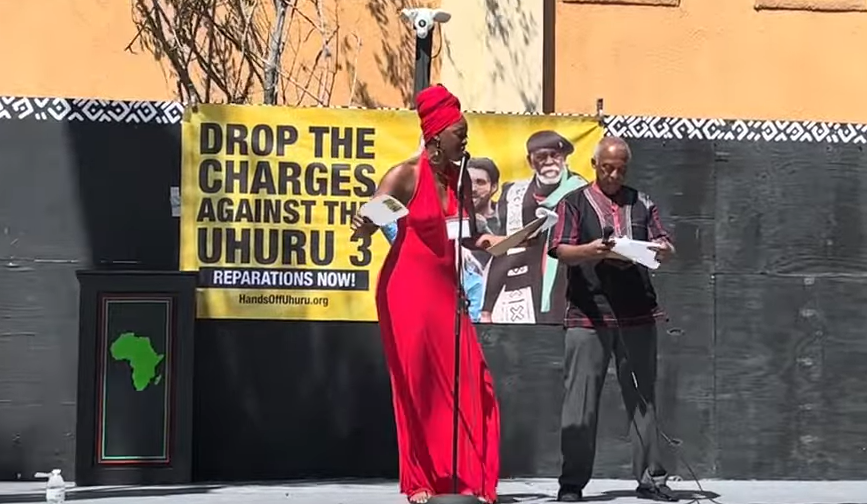
Their other “expert” witness was a counterintelligence and cyber security consultant and professor. The government referenced the witness’ writings in their response to the Uhuru 3’s Motion to Dismiss, arguing that “the term ‘disinformation’ does not refer to information that is necessarily false.” Rather, the government said, it refers to information that makes the government look bad.
On the stand, this “expert” witness presented concepts from his latest book. When cross examined, he confessed he did not have any direct knowledge of the Uhuru 3 case.
A string of FBI “special agents” took the stand and gave tedious testimony on each of their narrowly assigned scopes of duties. They described photos of possessions found during the raids on the defendants’ homes, such as books on a shelf and scraps of paper. They read serial numbers from computers and phones.
Court observers were incredulous as one FBI special agent took the stand and began to read through the same emails and WhatsApp messages that previous witnesses had already read.
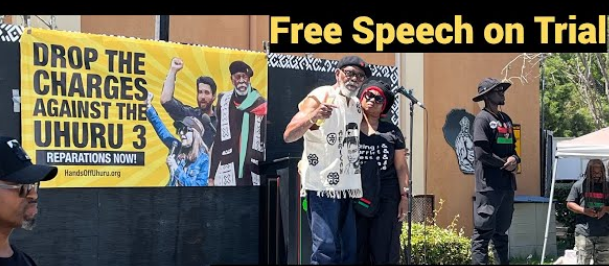
An FBI digital forensics agent described how he copied and compiled data from seized documents, emails, iCloud accounts and Facebook messages in order to create summary reports consisting of only those portions chosen by their supervisors. In other words, they combined bits of information out of context in order to fabricate their false narrative.
The government claims that Chairman Omali came into the employment and control of the Russian government in 2015 when he traveled to Moscow to speak at a conference organized by the Anti-Globalization Movement of Russia.
In his opening argument, Uhuru 3 attorney Mutaqee Akbar turned that story right side up. He reminded the jury that 2014 was a pivotal year for the rise of social movements in the U.S. protesting police violence after a string of police killings of Black people.
The Uhuru Movement was a prominent voice in those protests. It received many offers of support including from the Anti-Globalization Movement of Russia. So it was the leadership of the Uhuru Movement that attracted support from around the country and the world. It was not the orders of a Russian NGO that caused the Uhuru Movement to do the work or express the opinions it had been doing for more than 60 years.
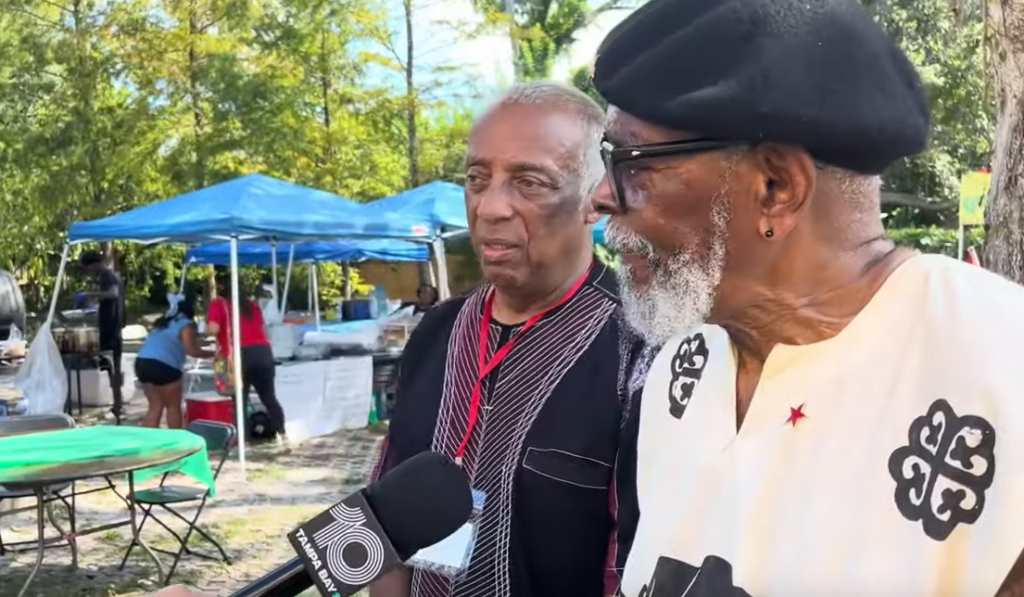
Week one of the trial proceedings also included a Russian-born FBI special agent who testified that reading the documents given to her by her supervisor convinced her that AGMR head Alexander Ionov was an asset of Russian intelligence. Then, under cross-examination, she admitted she didn’t have any direct contact with any Russian nationals and did not do any independent fact-checking of the documents she read.
The prosecution introduced communications from AGMR’s president Ionov seeking to discuss Jesse Nevel’s 2017 campaign for St. Petersburg mayor. Under cross examination, the FBI agent admitted that the government has no evidence that Nevel ever worked with Ionov on the local electoral campaign nor did he receive any campaign donations from any Russian.
Chairman Omali has explained that while the Uhuru 3 are clearly innocent according to the law, the government hopes the specter of “Russia, Russia, Russia” and “Black, “Black, “Black”, will sway the jury to rule based on prejudice rather than facts. The Uhuru 3 are hoping that the members of the jury will see through the government’s fabrications and decide to preserve the U.S. Constitution’s First Amendment protections of speech and dissenting opinion.
The trial continues on Monday, September 9, with cross examination of the latest FBI agent, followed by one more government witness. Then, the Uhuru 3 attorneys will begin their defense and the case may go to jury deliberations later in the week.
The case is being heard on the 17th floor of the Tampa Federal Court. It’s the largest courtroom in the courthouse. It has been packed with supporters all week spilling into an overflow room.
More info at www.handsoffuhuru.org
